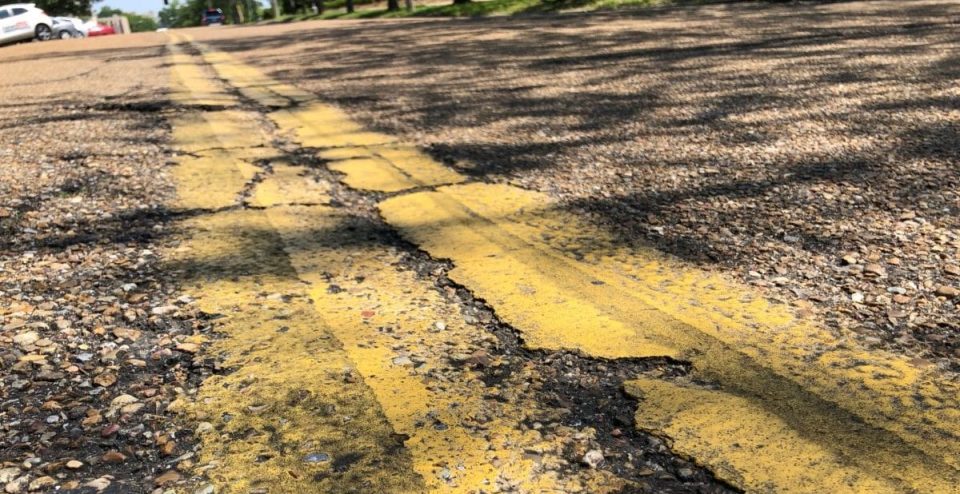The Mississippi Legislature’s Democratic Caucus held a meeting to discuss the transportation and infrastructure crisis in the state.
During the public meeting, Senators and Representatives heard from Scott Waller, President, and CEO of the Mississippi Economic Council, Ms. Sheri Veasey, Executive Director of the Mississippi Municipal League, Les Childress, Mayor of Flora, and Transportation Commissioner Dick Hall.
During Waller’s testimony, he referenced a report that came out in December 2015. At the time, the analysis of data found that $607 million was needed to repair or rebuild just the roads that were classified in very poor condition. Together those needs totaled $6.6 billion.
The data also found that 13,192 miles of local roads are in very poor condition and would require an estimated $607 million for repair.
In the past two years, Waller said they have asked businessmen and women whether infrastructure was something that needed to be addressed. According to Waller, 98% said it was needed and 96% of those people said they would support a 10-year plan to incrementally address the needs of the state.
“The longer you wait, the worse the system is going to be and the more it is going to cost to fix the issue,” Waller said. “At the end of the day a lot of attention is being placed on this and a lot of efforts are taking place. It is our hope that we will see a continued effort to find a solution to funding the needs that we have right now in our transportation system.”
Waller said that since 1987 there has been a 180% increase in inflation and an almost 215% increase in structure costs. He compared this to Mississippi’s 18 cent gas and diesel tax which has not been increased since 1987.
“The bottom line is real simple,” Waller said. “Failing to do this is going to put us behind the 8 ball. We have to think about the ramifications of what it means for us and we have to look at it from the opportunity perspective. We have the opportunity now to address an issue that will pay dividends for the state of Mississippi for a long, long time.”
Transportation Commissioner Dick Hall said that Mississippi is losing people to other states that are not coming back and people are not moving to the state either.
“Nearly 10,000 American born people left the state than moved here between July 2015 to July 2016,” Hall said. “If Mississippi would have been any other southern state we would have added 10,000 people from other states. What’s this got to do with a plan to update the transportation system? Absolutely everything! Without this plan, we are not going to be competitive in this worldwide economy.”
Hall referenced a recent (April 2018) poll done by Mason Dixon Strategy that said that 84 percent of likely voters believe it is the legislature’s responsibility to come up with a long-term solution. Two-thirds of voters see raising the fuel tax as a viable solution, provided the increase is phased in. When asked if they supported a four-year, phase-in of up to 12 cents a gallon, 67 percent support such a plan, with 18 percent opposed.
“I will argue with anyone that the 1987 highway program was the number one economic development event in this state in the last half-century and its time to do something like that again,” Hall said.
However, Hall said it all comes down to the money and that at some point there has to be some investment.
“If you don’t invest you are not going to earn anything,” Hall said. “You are not going to make a profit, you are not going to get ahead. Mississippi’s economy is the worst and its time to say, ‘okay, we’re going to bleed a little bit, but let’s get the money together and let’s make the kind of investments we have got to make to make this economy worth something.”
While the House and the Senate have yet to come to an agreement on where the money should come from Hall said he would recommend either a gas tax or a use tax.
“The thing about a fuel tax is that it’s the fairest tax of all,” Hall said. “It’s a person using the system that is paying for it. I don’t understand what the problem is. Other states do it, that’s the way we did it 31 years ago and it is time to do something again… If you don’t do something soon the system is going to fall apart and it is way overdue to fix it.”
Senator David Blount who was also in attendance at the hearing added that while there is a $50 million bond bill for county roads and bridges the amount is too small to fix the whole problem.
“What we don’t have and what we desperately need is a long-term plan to maintain and build state highways, county roads and bridges, and city streets, many of which are crumbling,” Blount said. “There has been no leadership in the legislature on this issue and nothing has gotten done but it needs to happen, and soon.”






